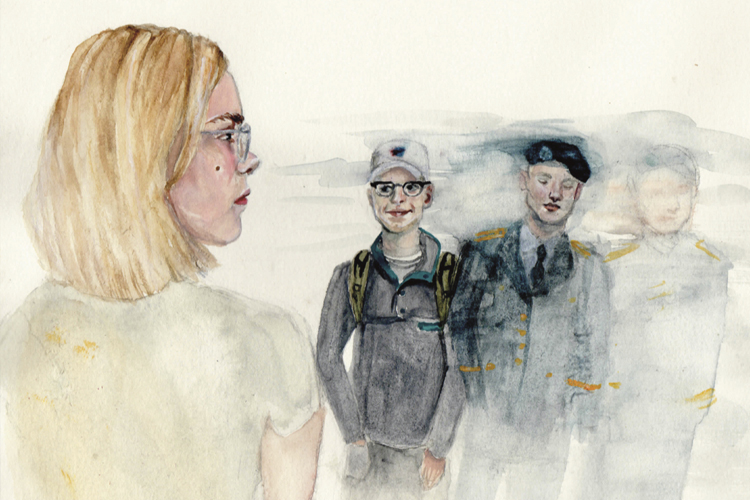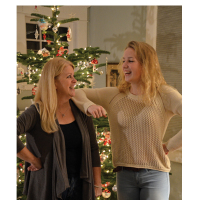
I remember the first time my brother Joe left for the army. My gaze shifted from the brightly lit Sheraton Inn sign to my brother as he flipped through a pamphlet that read ‘Be All You Can Be’ in bold, dark lettering. As our silver Volkswagen Passat came to a stop at the entrance of the hotel, my heart began to beat nervously and the silence between us became heavy.
He opened the door and began to say his goodbyes to my step-dad and tearful mom. This was the first of many goodbyes to come while my brother completed his basic training course to become a combat medic in the army. But instead of being sad, my head clouded with uncertainty and my fists clenched as I watched his desert-colored backpack disappear behind the closing doors of the airport hotel. At that moment, I wasn’t sure how to feel and I was frustrated with my emotional confusion.
In the few weeks before he left for basic training, we didn’t connect as much as other siblings might have before a prolonged separation. Neither of us made an outstanding effort to talk outside of familial obligations even though I wasn’t going to be seeing him for the next three months. But this lack of interaction wasn’t out of the ordinary for my brother and I.
Joe and I were born six years apart, which naturally created distance between us. When I started elementary school he was already in middle school, and when I was in eighth grade he was a freshman in college. As a result, I struggled to relate to him and his values.
My brother’s attention deficit disorder diagnosis amplified this distance and made it difficult for me to understand the motivations behind his sometimes impulsive actions.
As a child, I often witnessed arguments between him and my dad about his lacking attendance and grades. I knew that he was smart from the progress report cards that were left open on the dining room table in which his teachers would write, “Talented and pleasant young man. Joe is very capable of doing better but he needs to organize his time outside of class.” I could not understand why he was unable to invest time into his education. I knew my brother had it in him to complete assignments and I could not relate to his lack of commitment because school often came easily to me. Even though I knew that he was a good person and I wanted to believe that he was conscientious, I started to judge him for his actions.
When Joe decided to join the army after his first year at Oregon State University, I assumed it was just another one of his poor decisions.
The night he left for the first time, we came home and my mother immediately collapsed onto the couch and began flipping through old photos of Joe. Tears cascaded down her cheeks and her shuddering breathing grasped for a sense of understanding.
As I sat across from her on the floor and cracked my knuckles nervously, it became clear that I didn’t understand her intense emotions. I was still confused and shocked by my brother’s decision. I had preconceived notions about why people join the army before I knew the underlying reasons for why Joe had chosen to do so. I had assumed that it was either a last resort for someone who had no place to go, that it was a tradition passed down through generations or that one might join out of patriotism and pride in their country. Most of all, I feared that he had joined because he felt like it was his only option after his rocky start at OSU.
It wasn’t until two months later that what I was truly feeling came to the surface.
In late April of 2017, my dance company took a trip to Coos Bay, Ore. to perform at an event. As we sat in a local pizza place eating dinner after our show, an advertisement on the bright display of the television set in the corner of the restaurant drew my attention. I watched as three men in army uniforms were given free ice cream for their service.
In that moment, the advertisement released something inside of me.
I felt a tightness in my chest and a lump in my throat as tears formed in my eyes. I turned away from the table and attempted to wipe away my tears, but my friends picked up on the noticeable difference in my usually happy disposition. I was quickly comforted by the people in my company but something about the situation was unfamiliar. That kind of emotional outburst is out of character for me.
As I sat under the flourescent lights of the restaurant, it hit me. From the moment he signed the contract, my brother had no choice in where he would be sent, where he would be fighting, let alone when or if he gets to come home. Although I didn’t want to admit it to myself, I was terrified of losing him and worried that he had made the wrong decision.
But when my brother came home from basic training, I saw a change in him. It was obvious from the enthusiasm in his voice when he told me about his first three months of training that he had found something he was committed to. Before he joined the army as a combat medic he was enrolled in the pre-medical program at OSU. My brother has always had an interest in helping people. I could see how much he loved what he was doing and how he thrived in the army’s fast-paced, high-pressure and community-oriented environment. In college he struggled to finish assignments because there was a lack of accountability that he needed in order to stay motivated. The army gave him that accountability.
I understood how he needed to be responsible in a way that he hadn’t been in high school. During his training, if my brother didn’t learn the medical practices that were required or do the physical training that was necessary, there were severe consequences. If he didn’t learn how to stabilize someone’s wound, one of the 60 soldiers that he was medically responsible for could bleed out. Being unable or unwilling to perform in the field could result in injury or even death. This resulted in his realization that his life and the lives of his fellow soldiers depended on him, and this fear of loss motivated my brother to hold himself accountable. He finally had an outlet for his impulsivity and restlessness.
In November of last year, Joe flew home from Texas and surprised my family. As I walked through the rows of parked cars in front of school, I looked up to greet whom I thought was my dad, and there Joe was. My heart pounded as I ran across the parking lot into his arms. By the time I got in the car, my cheeks were sore from smiling and my mind buzzed with excitement, unable to fully comprehend that he was here.
On the ride back, as we listened to music and caught up, I noticed something different about him. He expressed a real interest in my personal life. He asked me what music I had been listening to recently and as I played a few of my favorite songs at the time, we found a common ground that we hadn’t had before.
In a sense, it felt as if the physical distance between us had made us closer emotionally. After seeing how he came home appreciating the people that care about him more than he ever had before, I realized that his drastic decision to join the army ended up strengthening our relationship.
When it was time for Joe to leave after his surprise visit, my mom, stepdad and my brother’s girlfriend took him to the airport to say our goodbyes. As we waited in front of the security line, I felt different than I had the first time he left. Although I was nervous and sad to see him go, I wasn’t angry or confused, but happy. I knew that in the end his decision to join the army had helped him find his identity. My brother’s transition from the time he signed his contract to now, in which he has left for his first deployment to Iraq, has helped me understand myself better and how I deal with loss and the emotions that come along with it.
Before leaving, he pulled me into his arms. This time, I wasn’t afraid to release the emotions I had tried to suppress for so long. I began crying, my tears leaving dark spots on his shirt. He made his way through the security line and I dried my eyes as I watched his backpack disappear into the sea of luggage in the crowded terminal.




